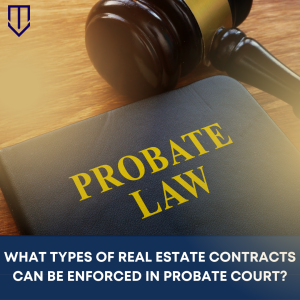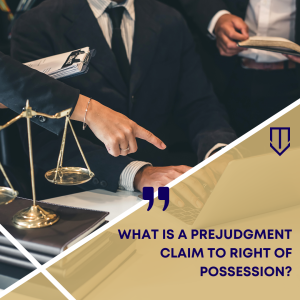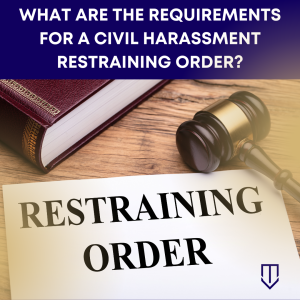 An action to quiet title allows a litigant to clear title or have the court establish title to a piece of real property where the title to that property is in the issue. Moreover, a quiet title action is not solely for the purpose of establishing a legal interest in real property but can also be asserted to establish an equitable interest in real property. For example, when two people claim that they own an entire piece of property, one of those parties may file a quiet title action to determine which one of the two persons actually holds title to the property.
An action to quiet title allows a litigant to clear title or have the court establish title to a piece of real property where the title to that property is in the issue. Moreover, a quiet title action is not solely for the purpose of establishing a legal interest in real property but can also be asserted to establish an equitable interest in real property. For example, when two people claim that they own an entire piece of property, one of those parties may file a quiet title action to determine which one of the two persons actually holds title to the property.
Sometimes, however, the other party will refuse to participate in the lawsuit, which requires a party to win by “default.” In those circumstances, a question arises about what is necessary to do to succeed. The law explicitly addresses these circumstances.
Specifically, Code of Civil Procedure section 764.010 provides: “The court shall examine into and determine the plaintiff’s title against the claims of all the defendants. The court shall not enter judgment by default but shall, in all cases, require evidence of the plaintiff’s title and hear such evidence as may be offered to respect the claims of any of the defendants, other than claims the validity of which is admitted by the plaintiff in the complaint. The court shall render judgment in accordance with the evidence and the law.”
 California Partition Law Blog
California Partition Law Blog


 Yes, although the tenant is not allowed to exclude the non-consenting owners. The reason for this is grounded in ancient legal doctrine regarding the “right to possession” that all co-owners of property share together. Each owner may exercise this right, and each may grant it to a third party, should they so choose, even without the consent of the other owners.
Yes, although the tenant is not allowed to exclude the non-consenting owners. The reason for this is grounded in ancient legal doctrine regarding the “right to possession” that all co-owners of property share together. Each owner may exercise this right, and each may grant it to a third party, should they so choose, even without the consent of the other owners. 
 While it may not be obvious, a sizeable portion of the work that real estate agents and realtors do is court-ordered. Real estate law is a massive field, and often, the disposition of litigation results in the court forcing the sale of a property, be it a business, home,
While it may not be obvious, a sizeable portion of the work that real estate agents and realtors do is court-ordered. Real estate law is a massive field, and often, the disposition of litigation results in the court forcing the sale of a property, be it a business, home,  Real estate contracts are an expansive field of both law and life.
Real estate contracts are an expansive field of both law and life.  In California, a real estate investment trust is “any unincorporated association or trust formed to engage in business and managed by, or under the direction of, one or more trustees for the benefit of the holders or owners of transferable shares of beneficial interest in the trust estate and (1) that formed for the purpose of engaging in business as a real estate investment trust under the Federal Internal Revenue Code, (2) the sale of the shares of which has been qualified at any time by the Commissioner of Business Oversight pursuant to the Corporate Securities Law of 1968, and (3) that in good faith has commenced business as a real estate investment trust.” (Cal. Corp. Code
In California, a real estate investment trust is “any unincorporated association or trust formed to engage in business and managed by, or under the direction of, one or more trustees for the benefit of the holders or owners of transferable shares of beneficial interest in the trust estate and (1) that formed for the purpose of engaging in business as a real estate investment trust under the Federal Internal Revenue Code, (2) the sale of the shares of which has been qualified at any time by the Commissioner of Business Oversight pursuant to the Corporate Securities Law of 1968, and (3) that in good faith has commenced business as a real estate investment trust.” (Cal. Corp. Code  Generally, a bankruptcy proceeding acts as a stay on the collection of debt as well as any acts needed to be taken to enforce a debt. The rules regarding
Generally, a bankruptcy proceeding acts as a stay on the collection of debt as well as any acts needed to be taken to enforce a debt. The rules regarding  A Prejudgment Claim to Right of Possession is a form used for the purpose of avoiding third-party claims in an eviction/unlawful detainer action. The Prejudgment Claim to Right Possession is for the purpose of giving notice to any unnamed occupants of a subject property that an eviction action has been initiated. After a prejudgment claim to right of possession, any unnamed occupants may file their own prejudgment claim form to preserve their rights in the subject property. If said unnamed occupants fail to do so, those unnamed occupants will lose their rights in the subject property, and the eviction action may proceed.
A Prejudgment Claim to Right of Possession is a form used for the purpose of avoiding third-party claims in an eviction/unlawful detainer action. The Prejudgment Claim to Right Possession is for the purpose of giving notice to any unnamed occupants of a subject property that an eviction action has been initiated. After a prejudgment claim to right of possession, any unnamed occupants may file their own prejudgment claim form to preserve their rights in the subject property. If said unnamed occupants fail to do so, those unnamed occupants will lose their rights in the subject property, and the eviction action may proceed.  A Civil Harassment Restraining Order is a type of restraining order used in California to stop a person from harassing or threatening another. However, the requirements for a civil harassment restraining order are slightly different than a typical restraining order. Essentially, a civil harassment restraining order is for the purpose of providing protection to a person that is the subject of harassment from someone they do or do not have a relationship with. Therefore, a civil harassment restraining order provides a legal intervention that restrains the harasser.
A Civil Harassment Restraining Order is a type of restraining order used in California to stop a person from harassing or threatening another. However, the requirements for a civil harassment restraining order are slightly different than a typical restraining order. Essentially, a civil harassment restraining order is for the purpose of providing protection to a person that is the subject of harassment from someone they do or do not have a relationship with. Therefore, a civil harassment restraining order provides a legal intervention that restrains the harasser.  Partnerships are incredibly common business entities that many Californians enter on a regular basis, often to acquire and develop real estate over many years. Unfortunately, many fail to get off the ground, as mismanagement, poor spending, and bickering derail what may have been promising ventures.
Partnerships are incredibly common business entities that many Californians enter on a regular basis, often to acquire and develop real estate over many years. Unfortunately, many fail to get off the ground, as mismanagement, poor spending, and bickering derail what may have been promising ventures.